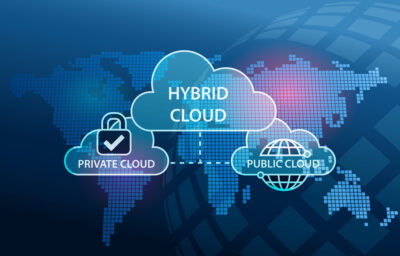
Using cloud-based services or a cloud provider to access computing resources ensures business continuity. This approach offers a cost-effective way to secure IT infrastructure, and physical infrastructure is becoming the new normal. Furthermore, it allows companies to scale resources and manage operational costs more efficiently, making it an essential part of a modern business strategy. These benefits help businesses stay competitive in a rapidly changing environment.
According to global corporate data, more than 90% of Fortune 500 companies rely on cloud or cloud-based tools for at least a portion of their underlying infrastructure. In addition, with 10 of 18 industrial sectors, 100% of Fortune 500 companies are cloud-computing reliant.
Because of this growing necessity for cloud computing and cloud computing providers, varying cloud-based services are evolving. Today, the technology industry offers many cloud computing services tailored to a company’s distinctive IT infrastructure, storage space needs, operating systems, and overall budget.
Cloud computing options vary widely, from popular providers like IBM Cloud and Google Cloud to private clouds with enhanced security and tailored access management. These features ensure the protection of valuable data, demonstrating that the sky is the limit in cloud computing options.
So, what exactly are the benefits of cloud computing, and what are the varying cloud-based services available?
The answers to these cloud computing questions are both broad and detailed. Furthermore, understanding the benefit of cloud computing begins with understanding the foundational elements of cloud computing itself.
Table of Contents
How Cloud Computing Works
Different Cloud Services and Cloud Technologies
Cloud Computing Based on Deployment
What Are the Benefits of Cloud Computing?
Adopt the Best Cloud Computing Services for Your Business
What is Cloud Computing?
Cloud computing is essentially defined as the use of hosted cloud services. These include data storage, servers, databases, networking, and software, all accessible online. Data storage is conducted on physical servers which are housed within a data center. However, the cloud computing services provider manages and maintains the data center and computing resources.
Cloud technology has effectively replaced the need for organizations to have their own IT infrastructure and data centers. In addition, it saves valuable IT staff time and eliminates the extensive costs of maintaining on-premises infrastructure.
However, more important than the cost savings, is the data security that a cloud service provider can offer. Companies with their own data centers are vulnerable to multiple security concerns and crisis-level security risks, from power outages and age-related hardware deterioration to simple user errors that can result in catastrophic data loss. However, most cloud environments are designed to mitigate security risks in all forms, with features ranging from data encryption to operating of advanced and fully secure data center facilities.
How Cloud Computing Works
Instead of storing files on a data storage device, local server, or hard drive, multiple users save and access data in cloud systems. This means that everyone in an organization can access data and files with an internet connection. Regardless of whether they rely on desktop or mobile access, and while cloud storage may utilize arrays of hard drives, the data is not stored locally.
When it comes to cloud computing services, there are several options that go miles beyond cloud computing basics. Additionally, cloud services can be broadly divided into infrastructure as a service (IaaS), platform as a service (PaaS), and software as a service (SaaS). In contrast, the types of clouds can include public cloud, private cloud, and hybrid cloud.
Different Cloud Services and Cloud Technologies
Cloud Computing Based on Services
Cloud computing services are divided into infrastructure as a service, platform as a service, and software as a service. Let’s discover these three services below.
Infrastructure as a service or IaaS
Infrastructure as a service or IaaS cloud service providers are responsible for the cloud servers, cloud storage, and networking. These services are all provided over a virtual interface that can be accessed with an internet connection. In the IaaS service model, the end user does not need to manage the cloud infrastructure. Still, the end user does have control over the data storage, operating systems, and cloud applications. A third-party cloud services provider hosts the hardware, data centers, software, and other infrastructure and hosts the applications and backups.
Platform as a service or PaaS
Platform as a service or PaaS cloud service providers offer the backbone and cloud-based development and deployment environment. At the same time, the user has the freedom to develop and run applications without the complexity of building or maintaining the behind-the-scenes infrastructure. The user can develop cloud-based applications but does not need to maintain the underlying infrastructure or data centers. Generally, in this type of cloud service, the user can utilize resources via a third-party vendor lock-in rate or can pay as they access resources over a secure internet connection.
Software as a service or SaaS
A SaaS provider allows end users to access the vendor’s cloud software development on a subscription basis. In this variation of cloud computing, the cloud user does not need to install or download cloud-based applications on their local devices. Instead, all cloud-based applications are on remote cloud networks or remote servers, which can be directly accessed via the web or an API.
In the software as a service model, the cloud services provider is responsible for all hardware, middleware, application software development, IT infrastructure, and security risks. This makes it easy for organizations to access data and applications, without worrying about security features, automatic software updates or other cloud technology maintenance and development concerns.
Cloud Computing Based on Deployment
There are essentially three distinct ways to deploy cloud services: a public cloud, a private cloud, or a hybrid cloud. Below is an overview of each of these cloud-based solutions and their potential cloud costs.
Public Clouds
Public clouds are essentially clouds that are owned and operated by a third-party cloud services provider which delivers multiple computing resources like services and data storage via an internet connection. With a public cloud, all the hardware, software, and other cloud infrastructure is solely managed by the cloud provider, and end users essentially access these cloud services via an internet connection.
A public cloud has inherent advantages and disadvantages. Public cloud providers save organizations from purchasing and managing their own on-premises infrastructure or data centers since the cloud providers are responsible for all aspects of cloud storage and access.
While public clouds often result in cost savings for the end user, this does mean that an organization has limited control over security risks and computing power. As a result, organizations may be more susceptible to data loss or have limited options when it comes to quick data recovery or disaster recovery.
Despite the common pros and cons associated with public clouds, choosing the right provider can significantly mitigate these disadvantages. At DartPoints, our public cloud matches the flexibility, reliability, and performance of leading global providers and enhances security and compliance through unique offers. Our additional services, such as Managed Backup and Managed Security, are specifically designed to address and reduce these risks, setting us apart in the public cloud landscape.
Private Clouds
As the name implies, a private cloud refers to cloud computing resources that are solely developed for and used by a single organization. A private cloud can be physically located at an organization’s own data center or a third party’s data center, depending on the distinctive needs or requirements of the client. In a private cloud, all services and infrastructure are maintained on a private network, tailored to the specific organization’s cloud computing requirements. A private cloud has all the benefits of a public cloud, like scalability, computing power, and availability of cloud-based applications with an internet connection. However, this cloud infrastructure is completely customized.
Another benefit of a public cloud via a private cloud is security. A private cloud is the best option for companies that deal with sensitive data, as the security controls are inherently more rigid, and only one organization has access to the lone private cloud. The main drawback to private clouds is the cost. Developing a private cloud may not be the best option for smaller businesses, however, a private cloud adoption may be surprisingly within reach for organizations of all sizes with the right private cloud provider.
Hybrid Cloud
A hybrid cloud is often a solid cloud-based solution for organizations that can benefit by utilizing varying aspects of a public cloud and a private cloud. In the hybrid cloud model, both public and private cloud features are found, and this cloud model allows workloads to effectively shift or be distributed between private and public cloud options. Hybrid clouds effectively allow businesses to maintain and utilize their own existing IT infrastructure, but with the freedom and flexibility to access the public cloud to handle any overflow.
A hybrid cloud is an optimal solution for many organizations, especially when a top hybrid cloud provider is enlisted, as it creates both a flexible and cost-effective cloud-based solution for IT infrastructure. A hybrid cloud allows a company to grow and evolve, ensuring effective data storage regardless of changes in workload, with extra security and compliance requirements to protect sensitive data. When partnered with DartPoints Multi-Cloud Connector, organizations have even more freedom and can effortlessly implement a hybrid, multi-cloud, or cloud-to-cloud strategy without the in-house challenges of internal maintenance and transitions.
What Are the Benefits of Cloud Computing?
Regardless of which cloud services are best suited for your company, cloud computing has multiple benefits. It’s a long and detailed list, but some of the most obvious benefits of cloud computing include the following.
Cost Savings
Most companies do not have the resources required to maintain a dedicated data center and all the hardware and infrastructure that such an undertaking requires. As a result, cloud computing solutions can save tons of costs versus having your own infrastructure and data center without sacrificing computing power or data storage capabilities.
Flexibility
As a company evolves, so do their computing needs. With cloud computing, businesses can effectively scale all resources and data storage to meet the organization’s growing demands without having to invest in new infrastructure. Instead, the cloud can handle the increasing workload levels and can even be scaled down if these cloud computing resources are not being utilized.
Better Protection and Security
When it comes to protecting sensitive data, cloud computing security is unmatched, especially when an advanced cloud computing resource like DartPoints is enlisted as the primary cloud services provider.
Cloud providers can be responsible for maintaining all aspects of security and have additional procedures in place to perform backups and restore data in just a few clicks if there is a breach or disaster of some kind.
The key to ensuring the best protection of your sensitive data is to partner with a cloud provider that prioritizes security across the board, as well as additional measures like automated backups or security risk detection. It’s crucial to remember that not all cloud providers are created equal, so do your research and ask questions when deciding between cloud providers to ensure that even if you opt for a public cloud, your data is secure and there are data loss prevention measures in place.
A Competitive Edge
When it comes to software development, cloud computing inherently offers a competitive edge. The fundamentals of cloud computing foster new innovations by making it simple to try out new ideas and new applications without any hardware limitations or slow procurement processes. As a result, organizations can work faster – and better – with accelerated development and quick deployments.
Better Accessibility
With cloud computing, end users can access all resources within an organization from any place, at any time, provided they have an internet connection. With a rising transition to remote work environments across all industries, this allows organizations to be more productive, while giving their team members the freedom and flexibility to work from any location.
This is also useful when it comes to emergencies, such as natural or other disasters that are close to home. While a disaster may wreak havoc on on-site facilities and a brick-and-mortar office location in a particular area, regardless of power outages or other emergency situations, all data and resources within the organization are still readily available to end users.
Adopt the Best Cloud Computing Services for Your Business with DartPoints
Regardless of whether you are investigating your cloud computing options for the first time or are already reliant on cloud computing and want to determine if you have the right resources for your unique organization, DartPoints can help.
At DartPoints, our focus is solely on our clients and their distinctive cloud computing needs, which makes our cloud services stand out in a crowd of options. From cost-effective but incredibly secure public clouds to private or hybrid clouds that are designed to align with your company’s adaptable requirements, our 24/7/365 commitment to the best services possible allows our clients both peace of mind and the ability to have access to resources and technology that is typically reserved for the top 500 companies in the world.
Reach out to us today, and let’s start a discussion about your pain points, your needs and goals, and how our cloud computing services can help your organization evolve and grow. With a resource like DartPoints, your business can be at the cutting-edge forefront of cloud computing services now and well into the future.





